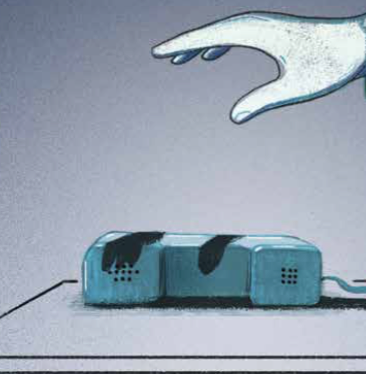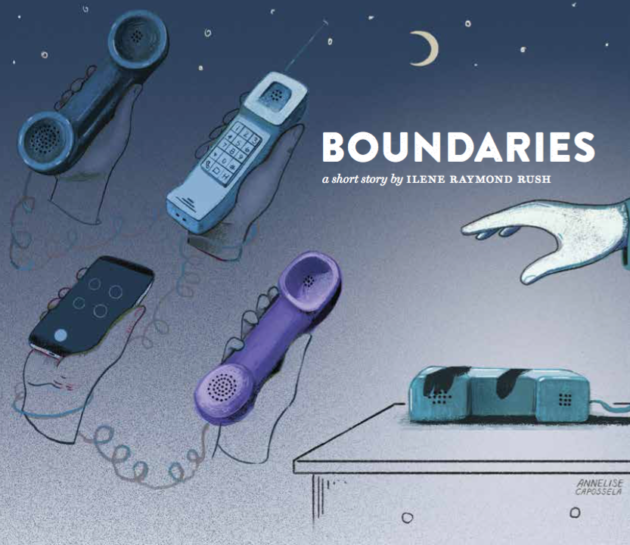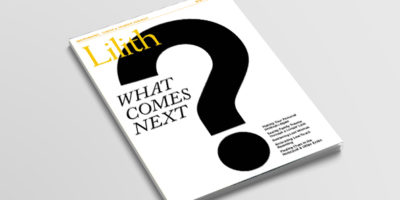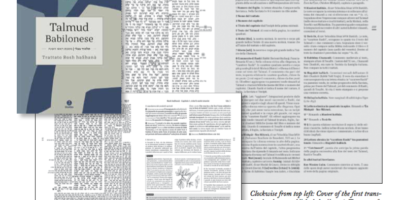
Boundaries
 Rennie Josephs entered Lily Manheim’s office for therapy via a personal referral. He knew one of Lily’s former patients, although he didn’t want to tell her which one. That was fine with Lily, but it did make her wonder what else he might be hiding.
Rennie Josephs entered Lily Manheim’s office for therapy via a personal referral. He knew one of Lily’s former patients, although he didn’t want to tell her which one. That was fine with Lily, but it did make her wonder what else he might be hiding.
Tall, with broad shoulders, long legs and flyaway grey-blond hair, Rennie talked of himself with a disparaging humor: he said he was a terrible-yet-aspiring songwriter, a not-so-successful businessman and a failed husband. Lily chalked this up to insecurity and his still evolving divorce; it was clear to her that he was a talented storyteller and a bit of a comic. She figured it would take awhile to get underneath why he felt he had to apologize for his very existence, but all in all, he seemed like someone who might be helped by therapy.
Rennie’s appointment started at 1:00; they finished at 1:50 and agreed to meet the same time the following week. Lily worked her way through the rest of her afternoon—a divorcee who was having trouble believing what was her life was now her life; a teenager subject to depressive episodes and cutting; a grandmother frantic about one of her grandchildren who was “running wild.” Lily listened, offered an occasional question and bits of carefully worded advice, wrote out billing sheets, and left the office shortly after five. On her way out, she told the office secretary that she’d see her Monday, wished the guard at the parking lot a good evening, then reached her Prius where she found a note tucked under the right windshield wiper.
“I know this is awkward,” it read. “But would you like to go for a drink, sometime?” It was signed, “Rennie.”
“Oh no,” Lily said out loud.
Not only was it awkward; it was extremely inappropriate. It meant rather than getting down to business during Rennie’s next appointment, they would have to discuss this note. Lily had learned this the hard way: once she had offered a patient who had issues with enmeshment the green angora sweater that Lily kept on the back of her chair when she said she was cold. The patient, Nora, a narrow professor of Victorian literature with a long pale braid and childlike hands, had visibly shrunk into her seat, as though Lily had threatened to detach a limb. Later, when Lily asked her about it, Nora had been clear —what if wearing the sweater diminished the separateness that she had been working on all these years? What if Lily’s sweater swallowed her alive? The implications turned out to be enormous. They had managed to make a joke of it, but it was a lesson Lily never quite forgot —one woman’s sweater was another woman’s worst nightmare.
In the parking garage, Lily stared at Rennie’s note. How had he known this was her car? Had he followed her to work? Asked the secretary or the garage attendant? For a second Lily flashed on Rennie, tongue caught between his teeth, bent over the scrap of legal paper, forming each letter, one at a time. A tick of empathy rose in her: it struck her that this invitation could not have been easy to write. Still, as she plucked the note from its place and put it into her purse, she knew it was completely unacceptable; it could not stand.
At her regular Friday night dinner with Meghan and Barry Rosen, Lily put the note aside. As she welcomed the Sabbath, she let the worry of the week fade from her mind. At dinner, she drank an extra glass of sweet wine and headed home carrying a container of Meghan’s chicken soup. About to get ready for bed, she heard her phone buzz, an unfamiliar number lighting up the screen. Sleepy, she answered without a thought.
“So what do you think?” he asked.
Lily drew a deep breath. Rennie Josephs. A spit of annoyance nudged her awake. She switched gears.
“I think you should not be calling my home number,” Lily said. “How did you get this number anyway?”
“I’m not a stalker,” Rennie said.
“You’re doing a good impression of one,” Lily said. She paused and took a breath. She worked on regaining the peace of the evening; anger never helped anything.
“Look,” she began again. “I’m willing to talk about this in our next session. But if you think it’s impossible for you to stop contacting me in inappropriate manners and accept that I am your therapist and only your therapist, I think you should…”
“See someone else,” Rennie finished the sentence.
“Yes,” she said. “I think that’s where we are. We can talk about this…” “Next week,” Rennie said. “See you then?”
On the other end, Rennie clicked off the phone. This was really too much. There was something familiar and disturbing in the way he jumped in and took over the conversation, barely leaving her room to breathe—a sort of blend of her ex-husband Del and her uber-rational daughter Natalie. Lily dropped the phone, went to the bathroom to wash her face and wondered if she should have cut him off right away.
The phone buzzed again. This time she picked it up without reading the number, prepared to tell Rennie that they were through and that she could recommend several people he might see instead, when her ex-husband Del’s voice popped on the line.
“What?” she asked.
“Good Shabbos to you, too,” Del said. “What do you want?”
“Have you spoken to Natalie?” “Why?”
“She has news.”
“What kind of news?”
Del paused.
“Are you sitting down?”
“Jesus,” Lily said.
“Ok,” Del said. “She’s getting married. Next month. She wants us to meet his parents. Soon.”
Lily was not sitting down, but as soon as Del finished the sentence, she dropped to the bed. In the dim bedroom, she closed her eyes. Behind her lids flashed pictures of Natalie, as a teenager, as a child. At her bat mitzvah, her confirmation class. The pictures flipped by quickly to the present, the last time she saw her daughter when she left Philadelphia for Brooklyn, furious and screaming, off to live with Jonah Emmerling, whom she had known for a grand total of six weeks. The last thing Lily, who had married Del at 23, had told her daughter was that she was throwing away her youth.
“I’m not you!” Natalie had cried.
They had not spoken since.
Lily parted her eyelids, realizing that Del was still on the other end.
“Del,” she asked. “Is this some kind of joke?”
“No,” said Del. She waited for more; Del always had something to add. She waited for him to yell surprise or tell her that he made it up. That this was an elaborate prank, designed to make her what? Angry? Sad? Happy? All at once? She was ready to jump on him, to accuse him of all of these things and more when it suddenly came clear.
“Del,” she screamed, “Why the hell did she tell you first?”
“You wouldn’t approve?”
“Damn right,” she said.
Lily hung up the phone. She thought of dialing Natalie, but it was close to midnight. Still, if her daughter had phoned Del with the news, she might be awake. She checked her own phone, but there were no messages.
When Britney Spears padded over to her, she leaned down, rubbing her head on the dog’s neck, wondering how everything got so upside down and mixed up. She had nurtured Natalie while Del ran around. Natalie had not talked to Del for her entire senior year of college. Yet he had been the chosen one to tell what could be the most important decision of Natalie’s young life. Or at least one of them.
You wouldn’t approve. Damn right.
The words echoed in her head. She knew, with a sharp certainty that any peace she had drawn from the Shabbat dinner was gone; she would not sleep that night. So instead she leashed up Britney Spears, and, in her nightgown and robe, took the Schnauzer down the steps to the front lawn. The dog, unused to being out at this hour, jumped forward, excited by the nighttime smells.
“Married,” Lily said. “At 23.”
She knew it was unfair, that just because the wheels had come off her own marriage didn’t mean that Natalie didn’t have a chance. But the truth of it was that even if she had not been divorced she would have tried to stop her, to tell her to take it slow. She imagined Natalie under a chuppa, pledging herself to a man she hardly knew. It was a rerun of Lily’s mistakes years ago. But who wanted to hear that when they had dropped into love, and thought that they had solved a riddle that had eluded everyone else? Certainly she and Del had not paused to think. If they had, there very well might not have been a Natalie at all.
Above her head, the moon hung, a totem to foolish romance. Lily sniffed, taking in a high scent of deer scat and exhaust fumes. She thought of Natalie, how they had stood on this front lawn a year ago and howled at the moon, how lost she had seemed. Was Natalie getting married to settle her life in some way? As a reaction to her parents’ divorce? Lily didn’t know. Lily, who had once known everything about her daughter, her shoe size, her birthday wishes, her silly childhood dreams, had lost the thread. It felt inconsolable, as though a membrane had been split, a tendon severed.
“Natalie,” she called out, startling the dog. Her voice reached into the night. “What the hell?”
Ruth called at nine a.m. Lily considered not taking the call, but there was always the chance that her mother had fallen, broken a hip, was headed towards the emergency room. Or worse. Eighty-five, as her mother often said, was no picnic.
“Mazel Tov!”
Lily didn’t answer but her mother barreled on.
“I heard from Del,” she said. “He called me late last night, where were you?”
Lily stared out the window, contemplating the many answers to that question, then said:
“Apparently out of the loop.”
“Don’t talk in riddles,” Ruth told her daughter.
“It’s a wonderful thing. Your only child getting married. He wanted to share.”
“I suppose,” Lily said.
“Lily,” her mother said. “This is your little girl.”
“I know that,” Lily said. “It’s just that somehow, she hasn’t gotten around to telling me.”
“Oh,” her mother said. “Well, maybe she…”
“Thought I might not approve,” Lily finished.
“Do you?” her mother asked.
Lily thought for a second.
“Mom,” she said. “I’m hanging up.”
“Lily,” her mother said, “don’t do anything you might regret.”
“Too late,” Lily told her. “That train left the station long ago.”
Two days later, and she had still not talked to Natalie. Lily had lifted the phone to call her several times, but a kind of angry shyness came over her. She was afraid of what she might say. She questioned herself: Was she so bitter? She had moved on, or so she thought until Del’s call. But now, she wasn’t so sure. All of her anger at Del seemed to have crystalized in her response to Natalie’s plans. Or, her so-called plans. After all, the only source of the news about the marriage was Del, hardly a reliable source. Upset, for the rest of the weekend, Lily had let the office answering service take her messages, with instructions to alert her only in an emergency.
And if her daughter, Natalie, called.
By the time Rennie arrived on Friday at 1:00 for his appointment, he and his note were the last things on Lily’s mind. Lily had spent the week debating what she might say to Natalie. How to employ her wisdom vs. scaring her daughter away. Lily ran arguments over and over again in her mind. Couldn’t they wait? She wanted to ask her daughter, practicing an even tone of voice. Maybe a long engagement, while everyone involved could go to counseling? After Lily and Del’s separation and divorce, Natalie had chosen sides: first Lily; now, apparently, Del. And why not Del? He had celebrated Natalie’s new love, while Lily urged her to slow down. Of course Lily could dissemble and tell Natalie everything was fine, but what about passing along a disappointed mother’s own hard-won wisdom concerning love? How could she stop Natalie from making the same mistakes she had made? Or should she just sit mum on the sidelines while Natalie made mistakes on her own?
She pushed her questions down, as she had been pushing all of her feelings down over the last few days. As far as her patients were concerned, nothing had changed since she last saw them the week before. Her job was to remain inviolable, immutable as a figure on Mt. Rushmore, a figure they could post their visions of themselves upon, not the other way around. They were not supposed to know anything of her personal life. In fact, part of her job was to carefully conceal the fact that she had a life, at all. The patients might know one or two facts on occasion, as needed. A story about Britney Spears, the dog’s name carefully edited out. The headline news that yes, indeed, she had a child. Or not. There were some patients with whom she had shared nothing, although she had known them for years and years.
“Hey there, ” Rennie said, poking his head around her office door. Lily looked up from his chart, and waved him in, swept by a little rush of annoyance, as the full memory of his indiscretions returned.
She indicated that he should sit, settled herself on her chair, faced him, and waited for him to begin. She saw them starting slow, then beginning to discuss boundaries, why he had left the note, what it meant to him, if he thought they should continue. If it were possible for her to trust him not to repeat such a gesture again. She opened her mouth, ready to proceed, when, suddenly, without forethought, she began to cry. Not little weepy tears, but full-throated squalls that left her throat and mouth raw, filling the office. It was hard to catch her breath.
She was appalled, ashamed. Yet she couldn’t stop. Her chest heaved. What was she crying for? Natalie? Del? Herself? She tried to think of other things—What she might have for dinner, what route she had taken to get to work—but there was nothing she could do at that moment but sob.
On the chair across from her Rennie went pale. He stood. At first she thought he was going to flee —which was probably what she might have done had their roles been reversed—but then he said, “I promise I will never leave you a note again,” and moved toward her chair and gently placed one hand on her shoulder. The inappropriateness of the note and the touch was nothing compared to her sobs; whatever hope there was of their continuing a therapeutic relationship as patient and doctor was done.
“I’m sorry…” she coughed, trying to get control. “I don’t know…”
He held a finger to his lips. He looked into her eyes.
“Did someone die?” he asked softly.
“My daughter,” she said. His face registered horror; she waved a hand in the air. “She’s getting married.”
“Ah,” he said.
This is where Del might have jumped in, told her she was crazy and to calm down at once.
But Rennie did none of these things. Instead, he kept his hand on her shoulder. She looked up and saw that his eyes were damp.
“I’m a contagious crier,” he said. He cleared his throat. “My mother died of MS when I was seven,” he said. “My father was emotionally distant. He remarried when I was nine to a woman who didn’t ever want children. I spent most of my time at my grandmother’s, who had never liked my mother. I decided at ten I would be a stoic when I read about them in Greek tales. My ex- wife says I don’t have feelings. And she’s right. Nothing upsets me really,” he said. Tears ran down his face.
Lily looked up.
“Is that why you’re here?”
“Maybe,” he said. “I really have no idea.”
Lily reached over and handed him a tissue and took two. They both dabbed their eyes and cheeks and chins. Lily loudly blew her nose.
“I’m so sorry,” Lily said. And then, “This is not how I operate.” “Me either.” He looked around the office, taking in her therapy books, her computer, her plants. “Do you really think that any of this helps?”
She sniffed. “Sometimes. Yes.”
Rennie reached over and lifted the green sweater from the back of the chair and dropped it around her shoulders. It was yet another boundary breaker, but to Lily it was the right thing, exactly what she needed. She stood up from her chair.
“What would you do if you were me?” Lily asked.
“Are you really asking my advice?”
Lily nodded.
“Call my daughter,” he said. “And then say a prayer for recovering.”
He tapped her shoulder one last time. And then he turned and left the office, closing the door behind him, probably forever.
Lily cancelled the remainder of her patients for the day, pleading allergies to cover her red nose and eyes, drove home and fell asleep at once, exhausted. At five a.m., she woke to the sound of Britney Spears, barking. “Britney,” she called. The dog ignored her. Lily rose, dragging the green sweater that she had not taken off her shoulders to the window. Outside, beneath the balcony, stood two huge bucks. Each had full antlers, and heads bent, they were charging one another across the stretch of lot where she had walked Britney a week ago, locking horns then pulling apart over and over again. In the early morning light, they looked like dinosaurs, prehistoric creatures locked in a battle to the death. Britney and she watched, Britney barking, she spellbound.
Over and over again they crashed into one another, as though they were trying to break the boundaries of body that divided them, as though they were trying to merge into a single, powerful, awful being. Over and over again they proved it could not be done. And yet. At around 6:30, with thin sunlight breaking the dark, the bucks gave up at last. Snorting and stamping, they separated, several female deer materializing behind each of them, and charged down the main road that snaked toward the small patch of woods that remained in the overdeveloped neighborhood. Standing by the window, Britney whimpered. Around them, the rooms of the house loomed, empty and still. Without thinking of the time, Lily reached for her phone and dialed Natalie’s number.
“Mom?” her daughter asked on the third ring. “Is something wrong?”
Lily didn’t answer right away. Instead she thought of giving birth to Natalie 23 years ago, Del nowhere to be found, Lily feeling as though the baby had turned her inside out. Natalie didn’t cry once except when she emerged; holding her after birth, the maternity nurse had called the baby’s composure remarkable. The baby had opened her eyes and looked around, taking everything in, as though she somehow understood that like it or not, this was the planet where she was now going to reside.
Ilene Raymond Rush’s fiction has recently been featured in Philadelphia Stories and Storychord. She is a recipient of an O. Henry Prize and is currently finishing a novel.





